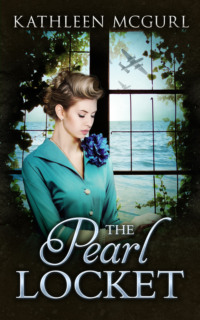
Полная версия
The Lost Sister

Praise for Kathleen McGurl
‘A MUST READ in my book!!’
‘Utterly perfect … A timeslip tale that leaves you wanting more … I loved it’
‘I may have shed a tear or two! … A definite emotional rollercoaster of a read that will make you both cry and smile’
‘Oh my goodness … The pages turned increasingly quickly as my desperation to find out what happened steadily grew and grew’
‘Very special … I loved every minute of it’
‘Brilliant … Very highly recommended!!’
‘Touched my heart! A real page turner … The perfect read for cosying up. I can’t recommend this gorgeous book enough’
About the Author
KATHLEEN MCGURL lives in Christchurch with her husband. She has two sons who have both now left home. She always wanted to write, and for many years was waiting until she had the time. Eventually she came to the bitter realisation that no one would pay her for a year off work to write a book, so she sat down and started to write one anyway. Since then she has published several novels with HQ and self-published another. She has also sold dozens of short stories to women’s magazines, and written three How To books for writers. After a long career in the IT industry she became a full-time writer in 2019. When she’s not writing, she’s often out running, slowly.
Also by Kathleen McGurl
The Emerald Comb
The Pearl Locket
The Daughters of Red Hill Hall
The Girl from Ballymor
The Drowned Village
The Forgotten Secret
The Stationmaster’s Daughter
The Secret of the Château
The Forgotten Gift
The Lost Sister
KATHLEEN McGURL

HQ
An imprint of HarperCollinsPublishers Ltd.
1 London Bridge Street
London SE1 9GF
www.harpercollins.co.uk
HarperCollinsPublishers
1st Floor, Watermarque Building, Ringsend Road
Dublin 4, Ireland
First published in Great Britain by HQ in 2021
Copyright © Kathleen McGurl 2021
Kathleen McGurl asserts the moral right to be identified as the author of this work.
A catalogue record for this book is available from the British Library.
This novel is entirely a work of fiction. The names, characters and incidents portrayed in it are the work of the author’s imagination. Any resemblance to actual persons, living or dead, events or localities is entirely coincidental.
All rights reserved under International and Pan-American Copyright Conventions. By payment of the required fees, you have been granted the non-exclusive, non-transferable right to access and read the text of this e-book on-screen. No part of this text may be reproduced, transmitted, downloaded, decompiled, reverse engineered, or stored in or introduced into any information storage and retrieval system, in any form or by any means, whether electronic or mechanical, now known or hereinafter invented, without the express written permission of HarperCollins.
E-book Edition © May 2021 ISBN: 9780008380519
Version: 2021-03-15
Table of Contents
Cover
Praise for Kathleen McGurl
About the Author
Also by Kathleen McGurl
Title Page
Copyright
Dedication
Chapter 1: Harriet, 2019
Chapter 2: Emma, 1911
Chapter 3: Harriet
Chapter 4: Emma, 1911
Chapter 5: Harriet
Chapter 6: Emma, 1911
Chapter 7: Harriet
Chapter 8: Emma, 1911
Chapter 9: Harriet
Chapter 10: Emma, 1911-12
Chapter 11: Harriet
Chapter 12: Emma, 1912
Chapter 13: Harriet
Chapter 14: Emma, 1912
Chapter 15: Harriet
Chapter 16: Emma, 1912
Chapter 17: Harriet
Chapter 18: Emma, 1912
Chapter 19: Harriet
Chapter 20: Emma, 1912
Chapter 21: Harriet
Chapter 22: Emma, 1914-16
Chapter 23: Harriet
Chapter 24: Emma, 1916
Chapter 25: Harriet
Chapter 26: Emma, 1916
Chapter 27: Harriet
Chapter 28: Emma, 1916
Chapter 29: Harriet
Chapter 30: Lily, 1920
Chapter 31: Harriet
Extract
Author’s Note
Acknowledgements
Dear Reader …
Keep Reading …
About the Publisher
For my son Connor McGurl, who helped develop this plot on many walks during lockdown.
Chapter 1
Harriet, 2019
How she would ever thin down her possessions enough to allow a move into a much smaller property, Harriet had no idea. She wandered from room to room, touching ornaments, stroking the backs of armchairs, running her hand along polished tables and sideboards. Everything was infused with so many memories of her seventy years. The little Toby jug on the mantelpiece that had been her mother’s and she remembered loving as a child. The dining room table and chairs that she and John had saved up for in the early years of their marriage, determined to buy decent furniture that would last them a lifetime. The large, squishy sofa, much more modern, bought only about ten years ago and so comfortable and perfect for stretching out on when reading a book. It would never fit in the kind of two-bedroom bungalow her daughter Sally thought she should buy. Neither would the dining table. But how would she ever part with them? And all this stuff was just downstairs. Upstairs she had four bedrooms and a study filled with more stuff. And then there was the attic – huge, and filled with endless boxes of who knew what.
That’s what they were due to start tackling today: the attic. Sally had suggested it when she’d phoned the previous evening. ‘I’ll go up there with you, Mum, and we’ll just do it bit by bit. Once we get started you’ll find it easier but I know how daunting it must feel.’
‘Are you sure you can spare the time, love?’ Harriet had asked. ‘What about Jerome?’
‘He’s doing well today. He’s in school, and he should be well enough to go to school tomorrow. So I’ll have time. See you around ten; get some chocolate croissants in for me from McKinley’s bakery, will you?’
‘Sure, of course, love,’ Harriet had replied. And now the croissants were warming in the oven, the coffee was made and at any moment Sally would arrive and they’d have to get started on the attic, going through the forty years’ worth of junk and memories that were stored up there. Outside it was a blustery March day, raining on and off. The perfect day to tackle an indoor job, even one that was likely to be difficult and emotional.
The doorbell rang and Harriet rushed to answer it, smiling as she greeted her eldest daughter, the one who’d stayed living close to her home in Bournemouth, the one she saw every week, who’d supported her when John died so suddenly and throughout the nine long months since, as Harriet adjusted to life without him. And all this even though Sally had so many troubles of her own. She gathered her daughter into a hug and kissed her cheek. ‘Hello, darling. Thank you so much for coming round to help.’
‘No problem, Mum. If I’m honest, it’s good to have a few days when I’m not just looking after Jerome. Did you get those croissants in?’
‘Of course! I was outside McKinley’s before it had even opened. We’ll have coffee and pastries first, before going up into that hideous attic.’ Harriet gave a fake shudder at what was ahead, and Sally laughed.
‘You know what, I reckon you’ll quite enjoy it once we get started, Mum. It’s quite cathartic, throwing out rubbish.’
Harriet nodded, and poured out the coffee. It wasn’t the rubbish she was worried about finding up there. It was the memories. ‘I’m sure it is. Anyway, sit you down and tell me, how’s my little grandson?’
‘On good form.’ Sally took a mouthful of warm pastry and had to immediately reach for a paper napkin Harriet had piled on the table, to mop up some escaped chocolate from the corner of her mouth. ‘Wow, these are as excellent as ever. He’s at a point in his treatment cycle when he has more energy than usual, enough to do a few days in school. I’m so glad. A bit of normality for him, a chance to play with his friends; and for me, a chance to do something else other than constantly change the DVDs while he lies on the sofa.’
‘Poor little mite. Is the chemotherapy working?’ Six-year-old Jerome had been diagnosed with an acute form of leukaemia a couple of months earlier. It had knocked them all for six. It just seemed so unfair.
‘I’m really, really hoping so, Mum.’
Harriet glanced at her daughter. Sally’s voice had cracked a little and there was a tell-tale glistening in her eyes. Time to change the subject, then. She knew that Sally hated showing how vulnerable she was, and found it hard to talk about Jerome’s illness. Even in the early days when he’d just been diagnosed, she’d struggled to put into words what the consultant had told her. Half the point of today was to give Sally a chance to take her mind off Jerome for a few hours. ‘Shall we get going then, if you’ve finished your coffee? I’ve pulled the loft-ladder down already.’
‘OK. Let’s do this.’ Sally stood up abruptly and rubbed her eyes, which Harriet pretended not to notice as she led the way out of the kitchen and upstairs. The hatch to the loft was above the landing, and they had to duck around the ladder. ‘You go up first, Mum, and be careful.’
‘I’m perfectly all right on the ladder, love,’ Harriet said. She might be seventy but she was fit and active, doing Pilates every week and cycling everywhere. Even so she climbed the ladder with care. It’d be mortifying to trip and fall with Sally here. Her daughter would never forgive her.
She flicked the light switch as she emerged into the attic. It was a large space, boarded over, and with a murky skylight set into one section of the sloped roof. There was very little free floor space – boxes were piled on top of boxes, carrier bags tucked into corners, small pieces of furniture stored haphazardly. John’s set of golf clubs leaned against a chimney breast. Half a dozen framed pictures were balanced against the golf clubs. Boxes of Sally’s and Davina’s old schoolbooks were tucked deep under the eaves. Three boxes of books and bric-a-brac she’d once sorted out to sell at a car boot sale that somehow she’d never got round to doing, were stacked in the middle. A pile of crates that she’d brought from her own mother’s house twenty years ago, meaning to sort them out, had never got further than her own attic and now sat in what had once been intended as a clear walkway through the space.
‘Well. Where shall we start?’ said Sally, as she emerged through the hatch and stood beside Harriet, hands on hips, gazing about her and trying unsuccessfully to hide her astonishment at the amount of stuff there was to deal with. ‘This is, I hate to say it, even more cluttered than I remember.’
‘I know. But I kind of know where things are – there’s sort of a system,’ Harriet said, sounding uncertain even to herself. ‘Over there’s Christmas decorations. All that lot is from your nan’s house. Stuff relating to you and Davina is in that corner. Photos and slides and the projector and whatnot over there.’
‘What’s this pile?’ Sally had her hand on a precariously stacked pile of boxes. The bottom one had ‘old stuff’ helpfully written on the side in marker pen.
‘No idea,’ Harriet had to admit. She had a horrible feeling the ‘old stuff’ box might have remained packed and sealed since she and John moved out of their last house and into this one, nearly forty years ago.
‘Well then, shall we start here?’ Not waiting for an answer, Sally heaved the top box off the pile, opened it and peered inside. ‘Vases. Salt and pepper shakers in the shape of church towers. A picture of the Coliseum.’
‘Ah. Mum’s old bits and pieces. I thought it was just that pile.’ Harriet gestured to boxes that sat on top of an old travelling trunk. ‘But yes, we can start here.’
‘So what’s the plan?’ Sally asked, holding the cruet set. ‘One pile for keep, one to go to charity or car boot sale, one to go to the tip? And only keep what’s valuable or really sentimental?’
Harriet smiled. Sally was so much more efficient than she was. Her daughter’s house was always tidy and clutter-free. ‘That sounds good to me. For a start, you can put that cruet set in the charity pile. I always loathed it. Mum bought them when on holiday in York many years ago.’
‘I quite like them,’ Sally said, ‘but I’m not keeping them.’ She looked around her, found an empty box that had once held an old cathode ray tube television set, and put them in. With a marker pen she pulled from her pocket she wrote ‘Charity’ on the side, then held up an ugly green glass vase with a crack down one side.
‘Bin,’ said Harriet, and Sally nodded. That was put into a different box.
They progressed quickly through the first pile of boxes, and by the end Harriet was pleased to find she was only keeping two small items: a pie funnel in the shape of a blackbird that she remembered her grandmother using, and a framed photo of her parents in their wedding outfits. The boxes marked ‘For the Tip’ and ‘Charity’ were full. ‘Let’s get these downstairs to give ourselves more space, have a cup of tea and then get back to it,’ Sally suggested.
Harriet agreed, and stayed in the attic while Sally went down, then passed the boxes down to her daughter. ‘The deal is,’ Sally said, ‘you need to dispose of these boxes as you go along. So when we’re finished today, drop those off at the charity shop and those at the tip before you do any more sorting.’
‘Yes, boss,’ Harriet said, making a mock salute. It was always easier to just go along with whatever Sally suggested. She had to agree with the sense of the system however. Little by little, bit by bit, was the only way, as Sally had told her. And actually, it was cathartic. With five boxes sorted there was a long way to go, but it was actually quite fun doing it with Sally. It’d be harder once they got to things that held all the memories of her life with John, she suspected. Though most of that was downstairs still, anyway. She’d be better off doing that herself, taking her time over it, enjoying the memories as she sorted through. Sally would make her rush it too much, and there’d be a danger she might throw away things she’d later regret.
After a reviving cup of tea (and after Sally had eaten another chocolate croissant), they returned to the attic.
‘What next?’ Sally asked.
Harriet looked around. It hardly looked as though they’d done anything, despite having worked for a couple of hours. ‘I suppose that lot. Keep going with Mum’s old stuff. Unless you want to tackle your old toys?’
Sally laughed. ‘Don’t say you’ve still got our old dolls up here! Surely they could have gone to a school fete or something?’
Harriet shrugged. ‘I always meant to. But then …’ She sighed. ‘Davina had her daughters, and I suppose I thought I’d keep the dolls …’
‘In case she ever turned up here with your other grandchildren in tow?’ Sally snorted. ‘Unlikely. She’s so bloody selfish. Those kids must be, what, eight and ten by now? And you’ve never been allowed to even meet them?’
‘I know, I know.’ Harriet waved a hand to stop Sally saying anything more. If she dwelt too long on the facts, she inevitably found herself sobbing. It hurt, it really did – the way Davina had left home as a teenager and cut off all contact other than occasional calls from a withheld number. How she’d let Harriet know by postcard about the birth of her first grandchild, two months after the event. How ten years on, she still had not met little Autumn, or her sister Summer. And that horrible day … the event that had hardened Davina’s resolve to stay away. The estrangement wasn’t entirely down to Davina’s selfishness, if she was honest. They’d all played a part in it.
But Sally kept talking. ‘Has she even called you recently?’
‘Not for a bit, no,’ Harriet had to admit.
‘Does she know? About Jerome, I mean?’ Sally’s tone was confrontational.
‘No. I haven’t had a chance to tell her.’
Sally rolled her eyes. A muscle twitched in her jaw as though she was trying to get her anger under control. A moment later she sighed and shook her head. ‘You’re right, Mum. We’ll not think about her any more. Let’s just get on with sorting out Nanna’s things. Right then. This box next.’ Sally opened a box marked ‘Ornaments’ and they continued the process of separating them into keep, charity, and tip piles.
Three boxes later they had finished all of Harriet’s mother’s stuff. Harriet was pleased to find she had only decided to keep half a dozen items from it all for sentimental purposes.
‘So now, this? What is it, some sort of travelling trunk?’ Sally patted the trunk that the boxes had been stacked on top of.
Harriet nodded. ‘That was my grandmother’s sea trunk I think. Mum had it stored in her attic and after I cleared her house, I just moved it here.’
‘What’s in it?’
‘No idea. I’ve never looked. It’s locked, and I don’t have a key. But we’ll never manage to get it downstairs and out of here. Maybe we can just push it to a corner of the attic and leave it here when I sell up.’
Sally stared at her mother, an expression of utmost horror on her face. ‘Absolutely no way, Mum. We are not just leaving this. There could be some real gems in here. What do you mean, her sea trunk?’
‘My grandmother worked on board ocean liners when she was young,’ Harriet replied. ‘I guess this is what she packed her stuff in, to take on board ship. Grandpa worked on them too – it’s where they met.’
‘Yes, there are labels on it – White Star Line. That rings a bell,’ Sally said, frowning as she peered at the sides of the trunk.
‘That’s the one. Gran worked on the Olympic, which used to sail back and forth across the Atlantic from Southampton to New York.’
‘Hmm. But you say you don’t have the key?’
‘Not anywhere I know of. Shame.’ Harriet ran her hand across the top of the trunk, feeling its scratched and battered surface. Finding it had piqued her curiosity about her grandmother’s early life. As a child she could remember sitting on her grandmother’s knee, listening enraptured to tales of life at sea. She’d loved gazing at Gran’s wrinkled and powdered face, watching her eyes light up as she told her stories. She could remember the feeling of Gran’s arms wrapped around her, the smell of her perfume and powder, the gentle sound of her voice. But she couldn’t remember much of the detail of Gran’s stories – just vague impressions of her talking about her job as a stewardess on board ocean liners, being run off her feet by spoilt and demanding passengers.
And now here, in her attic, was Gran’s old sea trunk. Harriet sighed. How she’d long to see inside it!
‘Mum?’ Sally was on her knees in front of the trunk, looking closely at it. ‘Thought you said this was locked?’
‘It is.’
‘No, it’s not. It’s just held by a catch that’s a bit stiff. Look.’ Harriet watched as Sally prised open the catch then pushed the lid up with both hands. It made a cracking sound as it rose, as if decades of dirt that had sealed it were being broken, but then it was open, the lid leaning back on its hinges, and the contents of the trunk exposed for the first time in many decades.
Chapter 2
Emma, 1911
Emma Higgins’ earliest memory was of being on board a ship. Well, it was not really a ship, she supposed. It was a ferry, a steamer operating between Southampton and Cowes, on the Isle of Wight. She’d been about four years old, her sister Ruby just a babe in arms and her sister Lily not yet born. She’d been so very excited to be on board a boat, amazed that such a huge thing could float, and astounded at the views from the deck as Southampton faded into the distance and Cowes loomed ever closer.
The family were on the ferry because they were moving to the Isle of Wight, where Emma’s father, George, had secured a job working in a new hotel in the fashionable resort of Sandown. ‘There’ll be a beach for you to play on,’ he’d told Emma, ‘and the sea for you to paddle in. We shall have a wonderful life in Sandown!’ But it was the sea crossing – steaming down Southampton Water and then across the Solent – that had captured little Emma’s imagination. When she looked back on it, she thought that was probably the moment that determined her lifelong fascination with being at sea.
They had lived in Sandown, George working in the hotel and Emma’s mother Amelia taking in sewing, for almost ten years, until George had fallen prey to a gang of ruffians one stormy afternoon when he had been carrying the hotel’s takings to the bank to lodge. They’d beaten him and stolen the money, leaving him lying in a ditch with broken ribs and a smashed skull. He was found some hours later by a passing policeman but did not recover from his injuries. Amelia, on hearing the news, had collapsed and taken to her bed for a week, by which time the rent was due and there was not enough money to pay it.
Emma’s second sea crossing, therefore, was the return trip from Cowes to Southampton, where the now-fatherless family stayed for a while with Amelia’s sister until Amelia felt able to leave her bed, take on work as a laundress and seamstress, and move herself and her daughters into a tiny terraced house near the Southampton docks.
Now, as Emma hurried back to that same terraced house, bursting with her news, she wondered what her mother and sisters would make of what she had to tell them. Would they be pleased? Or fearful? She had no idea. All she knew was that this felt like her destiny. A chance to go to sea again – properly to sea! – and actually live on board a ship. It felt so right. It seemed like a job that had her name on it; a job she’d been meant to do since she was four years old and had marched onto the bridge of the paddle steamer on the way to Cowes, demanding to see the horses that powered the ship. Her father had been simultaneously mortified and delighted by her audacity, she recalled, and the ferry’s skipper had picked her up and let her hold the wheel for one brief, glorious moment.
She turned a corner, passed the small grocery shop where Ma went every day to buy the family’s dinner, waved to the little girl who lived across the street and was playing out with a hoop and stick, and found herself running the last few yards to her front doorstep, where she almost tripped over her sister.
‘What are you doing sitting out here, Ruby? You’ll make your skirts all dirty and Ma’ll be furious.’
‘Huh. I scrubbed the step this morning so it’s clean as anything. Sitting out here because it’s better than being in there.’ Ruby pointed over her shoulder with her thumb at the house.
‘Oh dear. What’s happened now?’ Emma sighed. Her news would have to wait a while. She nudged Ruby with her foot to make her move over, and sat beside her.








